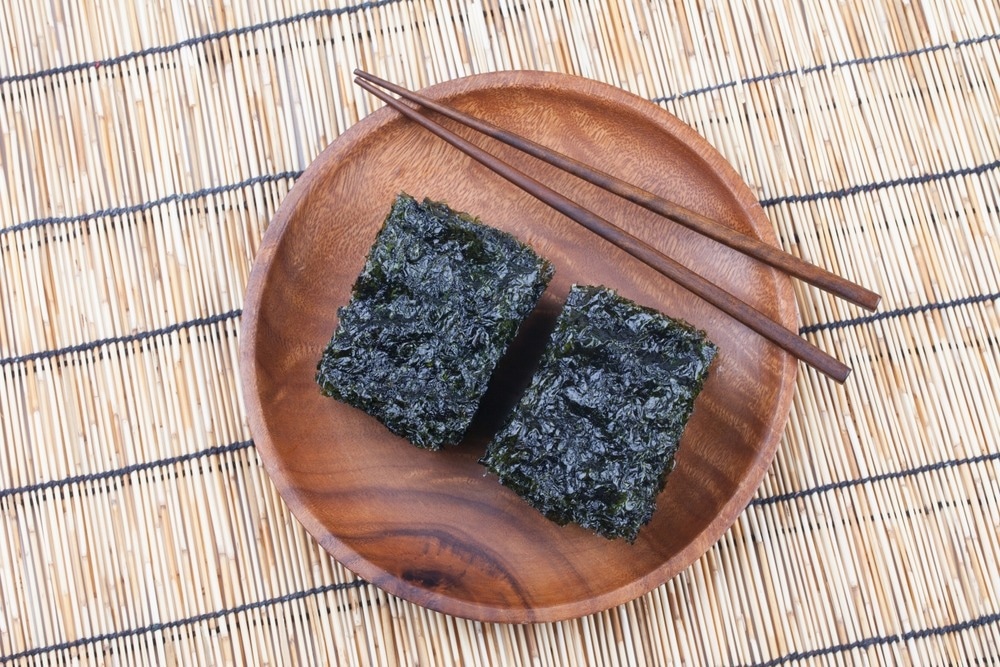The study found that consuming 5 g of nori per day for 4 weeks significantly improved vitamin B12 status in vegetarians.
Vitamin B12 is an essential nutrient found in eggs and dairy products, including cheese and yogurt, fermented tofu, kimchi, and mushrooms, among other plant foods. Many plant milks are also fortified with B12.
Vegetarian diets may be deficient in this vitamin. A recent report in the European Journal of Nutrition examined how dietary nori (from purple laver) could improve the B12 status of vegetarians.
Vegetarian diets and B12 deficiency
Vegan diets contribute only 25% of the greenhouse gas (GHG) emissions that high-meat-based diets do. However, plant-based diets must be tweaked to ensure adequate intake of all necessary nutrients, including B12. In a recent Taiwanese study, vitamin B12 deficiency was present in 26% of vegetarians vs. 1% of omnivores.
Sea vegetables and B12
Edible plants from the sea, including algae, form part of the East Asian diet. They contain B12 but also inactive analogs that competitively inhibit B12 absorption.
Purple laver is a sea vegetable (family Neopyropia). It can supply the recommended dietary allowance (RDA) of 2.4 µg. However, Western nutritionists do not support sea vegetables, including nori, as a B12 source.
In Taiwan, roasted nori is most commonly used. Its vitamin B12 bioavailability has not been measured in a properly designed randomized controlled trial (RCT), leading to the current study.
The aim was to test if nori is a bioavailable B12 source and whether its intake can adequately improve B12 levels to the RDA in vegetarians.
About the study
The researchers set up an open-label RCT. The participants were between 20 and 60 years old, vegetarian for at least a year, and not on any supplements containing B12, folate, or fortified yeast. Other confounding factors were also excluded.
Those who already ate eggs, dairy, or fortified plant milk were specifically instructed to continue the same eating pattern, as the measurement of B12 would be adjusted according to the baseline.
The participants were assigned to one of three groups: controls (no nori), low-dose (5 g nori or 2.4 µg vitamin B12 per day), and high-dose (8 g nori, or 4 µg vitamin B12 per day. The dosages recommended to the RDA in the USA and Taiwan and the adequate intake (AI) recommended by the European Food Safety Authority (EFSA), respectively.
The intervention was performed for four weeks. However, due to a lower actual B12 content in the nori used during the trial, the intake values were changed accordingly to 1.9 µg and 3.1 µg for 5 g and 8 g of nori, respectively.
A panel of serum B12 markers was used to overcome single marker limitations. These included serum vitamin B12, holotranscobalamin (holoTC), homocysteine (Hcy), and methylmalonic acid (MMA), and a combined score, the 4cB12 score.
The dietary content of B12 was measured at baseline and after four weeks using a customized food frequency questionnaire. The baseline measures were used to arrive at the least square means (LSM) of changes in the B12 levels across the study period.
Nori improves B12 levels
During the study period, dietary intake of B12 increased from a mean of 0.3 µg/day to 2.0 µg/day and from 0.5 µg/day to 3.5 µg/day in the low-dose and high-dose groups, respectively. Of the total, the contribution of nori was 1.9 µg and 3.1 µg, respectively.
In both nori groups, all vitamin B12 biomarkers improved, indicating a consistent reduction in the post-study prevalence of B12 deficiency, in contrast to varying changes across biomarkers in the controls.
The consumption of nori increased serum B12, holoTC, Hcy, and 4cB12 levels. Serum MMA levels remained constant across the three groups but did improve in the low-dose group.
In the low-dose group, the B12 level rose to a steady level compared with controls. The LSM was +59 pmol/L, with the holoTC up by 28.2 pmol/L and Hcy down by 3.7 µmol/L. The 4cB12 score was increased by 0.67.
Similar changes without further dose-dependent rise occurred in the high-dose group for B12, Hcy, and 4cB12. No significant changes were seen in the serum folate levels in any group.
The lack of a dose-response effect might be because of the saturation of intrinsic factor (IF), which is responsible for B12 absorption. Differences in the B12 content per nori packet may also contribute, as it ranged from 23.1 to 52.8 µg/100 g of nori in year-round sampling. Still, all major nori brands contained at least 50% of the B12 RDA, indicating this to be a reliable source of B12.
Nori apparently produces B12, while fermented products or organic vegetables grown with manure-based fertilizers gain their B12 content from adventitious microbes that produce B12 or from unpredictable contamination.
The conflicting findings in other studies may have been due to the inclusion of other B12-analog-containing sea vegetables and algae. Errors in the food frequency questionnaire responses, confusing the various sea vegetables, might have contributed. Different processing techniques and consumption fatigue beyond 8 g nori per day (the maximum in this study) are other potential sources of error.
Conclusion
The consumption of 5 g nori per day for four weeks was linked to a significant improvement in serum vitamin B12 levels, with no further increase being observed at higher doses. These findings indicate that nori contains bioavailable B12 and not an inhibitory B12 analog. Other sea vegetables, such as Wolffia globosa duckweed and Taiwanese laver, should be individually tested.
The increase in B12 compares to that achieved by adding milk, whey powder, or B12-fortified toothpaste or oral B12 supplements to vegetarian or vegan diets. Even so, the only previous study showing normal B12 levels in vegetarians is the Adventist Health Study-2, due to their consumption of fortified foods and supplements.
Nori intake at increased frequency combined with B12-fortified foods may enhance B12 absorption and avoid consumption fatigue.
Source link : News-Medica

